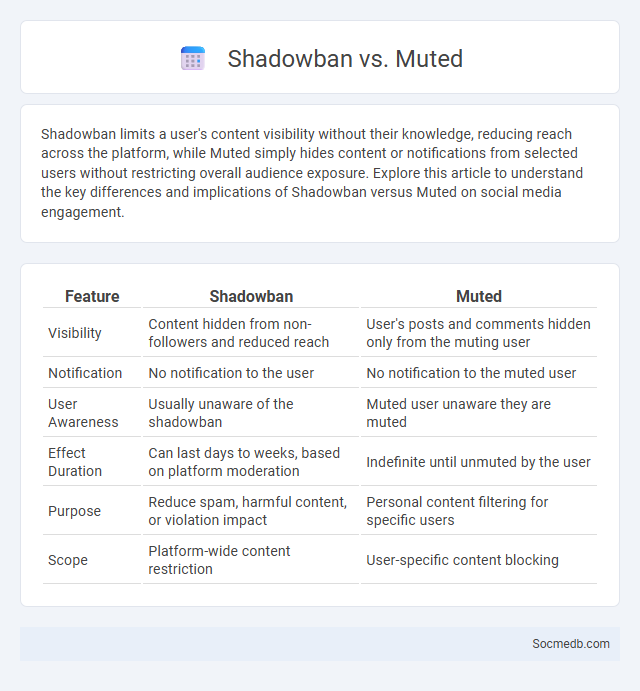
Photo illustration: Shadowban vs Muted
Shadowban limits a user's content visibility without their knowledge, reducing reach across the platform, while Muted simply hides content or notifications from selected users without restricting overall audience exposure. Explore this article to understand the key differences and implications of Shadowban versus Muted on social media engagement.
Table of Comparison
| Feature | Shadowban | Muted |
|---|---|---|
| Visibility | Content hidden from non-followers and reduced reach | User's posts and comments hidden only from the muting user |
| Notification | No notification to the user | No notification to the muted user |
| User Awareness | Usually unaware of the shadowban | Muted user unaware they are muted |
| Effect Duration | Can last days to weeks, based on platform moderation | Indefinite until unmuted by the user |
| Purpose | Reduce spam, harmful content, or violation impact | Personal content filtering for specific users |
| Scope | Platform-wide content restriction | User-specific content blocking |
Introduction to Social Media Visibility Controls
Social media visibility controls empower you to manage who can see your posts, profile, and personal information across platforms like Facebook, Instagram, and Twitter. Utilizing privacy settings such as audience selectors, block lists, and content filters helps protect your online presence and tailor your interactions. Properly configuring these controls enhances your social media security while maintaining desired visibility for your brand or personal content.
Defining Shadowban: What It Is and How It Works
Shadowban on social media refers to the covert restriction of a user's content visibility without explicit notification, limiting reach and engagement. Platforms implement shadowbans to reduce spam, misinformation, or harmful behavior by obscuring posts from public feeds or hashtag searches. This hidden moderation method affects account performance by diminishing organic growth and user interaction while maintaining the appearance of normal activity to the account owner.
Understanding Mute: Features and Functionality
Mute on social media platforms allows users to hide posts or stories from specific accounts without unfollowing or blocking them, preserving privacy and control over content consumption. This feature enhances user experience by reducing unwanted noise or negativity while maintaining connections and engagement flexibility. Platforms like Twitter, Instagram, and Facebook integrate mute options to offer tailored content feeds and promote healthier online interactions.
Shadowban vs Mute: Key Differences Explained
Shadowban limits a user's content visibility without notification, causing posts to disappear from feeds and search results, while mute simply hides another user's posts or stories from appearing without affecting the muted user's content reach. Shadowbanning restricts engagement metrics and follower growth, often used by platforms to quietly enforce community guidelines, whereas muting allows users to customize their feed without penalizing the muted account's performance. Understanding these distinctions helps users navigate platform moderation tools and manage online interactions effectively.
Signs You’ve Been Shadowbanned
Shadowbanning on social media platforms can severely limit your content's visibility without explicit notification. Key signs include a significant drop in engagement metrics such as likes, comments, or follower growth, your posts no longer appearing in hashtag searches, and friends or followers confirming they can't see your updates in their feeds. Monitoring platform-specific guidelines and using third-party tools designed to detect shadowbans can help identify and address this issue promptly.
How to Know If You’re Muted
You can determine if you're muted on social media by observing whether your comments or messages remain unseen or unacknowledged by the other user. Some platforms notify users if their messages are restricted or muted, but in many cases, subtle signs like a sudden drop in interactions or lack of responses can indicate muting. Monitoring changes in engagement metrics and testing communication through different channels can help you confirm if your social media presence is being muted by someone.
Impact of Shadowban on Online Presence
Shadowban on social media platforms significantly reduces content visibility, leading to decreased engagement rates and follower growth. Influencers and brands suffer from diminished reach, which undermines their ability to attract new audiences and maintain online influence. This covert restriction disrupts digital marketing strategies and hampers authentic interaction with target communities.
User Experience: Muted vs Shadowbanned
Understanding the difference between muted and shadowbanned on social media is crucial for maintaining your online presence. When you mute someone, their posts and comments become invisible to you without notifying them, preserving your feed's quality. Shadowbanning, however, restricts your content's visibility to others without your knowledge, significantly impacting engagement and reach on platforms like Twitter and Instagram.
Avoiding Shadowbans: Best Practices
To avoid shadowbans on social media platforms, maintain authentic engagement by consistently following community guidelines and avoiding spammy behaviors such as excessive posting or using banned hashtags. Leveraging a diverse range of content types while monitoring account analytics helps identify potential restrictions early. Implementing regular account audits and engaging genuinely with followers enhances visibility and prevents algorithmic penalties.
Conclusion: Choosing the Right Social Media Strategy
Selecting the right social media strategy depends on identifying target audiences, aligning content types with platform algorithms, and analyzing engagement metrics to optimize reach. Prioritizing data-driven insights and adapting to trends ensures sustained growth and brand relevance. Effective strategies integrate consistent messaging with platform-specific features to maximize user interaction and conversion rates.
 socmedb.com
socmedb.com